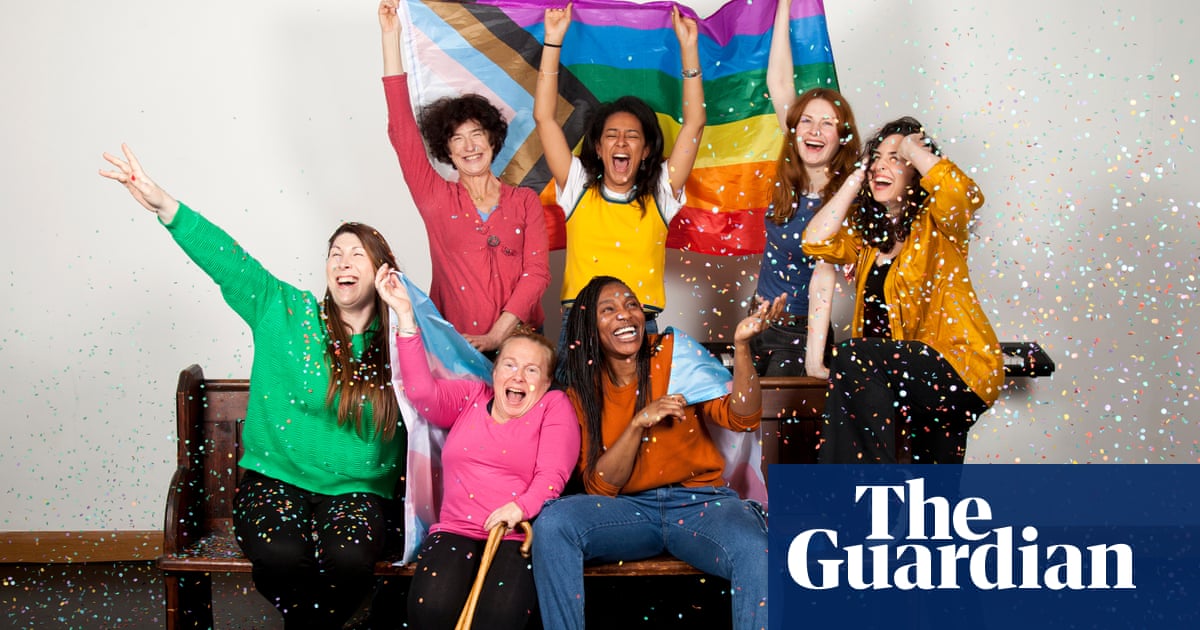
Show caption All the right notes … the cast of The Ministry of Lesbian Affairs. Photograph: Holly Revell Theatre ‘I want to create a lesbian mecca’: Iman Qureshi on her play about a glorious women’s choir After seeing how moved gay men were by The Inheritance, the playwright wanted to write something that would strike a chord with women – so came up with The Ministry of Lesbian Affairs Kate Wyver Mon 2 May 2022 08.00 BST Share on Facebook
Share on Twitter
Share via Email
A group of women are singing along to My Favourite Things, the old favourite from The Sound of Music, except the original words have been switched with lesbian-specific lyrics. “Wild geese that fly with the moon on their wings” becomes instead “the soft brush of pubic hair on my chin”. This is the raucous rehearsal for The Ministry of Lesbian Affairs, Iman Qureshi’s new play about a queer choir and the struggle for harmony within it.
The drama came about after Qureshi saw The Inheritance, Matthew Lopez’s epic inspired by EM Forster’s Howards End. “I watched an auditorium full of gay men wipe their damp eyes and hold hands in the dark,” she says. “That theatre is a kind of communal healing.” She saw the same thing at Larry Kramer’s The Normal Heart and felt an ache, realising she had never seen anything that gave a similar space to lesbian stories on stage: “I don’t think queer women have been given enough opportunities to sit in a dark room together holding hands, acknowledging those old wounds, and hearing their stories told. Hearing that they matter.”
Having grown up in the Middle East, Qureshi moved to the UK in 2003, as the repressive section 28 was only just coming to an end. “At school, the very worst thing you could be called was a lesbian,” she remembers. “It was a word loaded with disgust, used solely to bully. It was used in lieu of ‘freak’, ‘creep’, ‘ugly’, and ‘pervert’, and carried the venom of them all.” Through writing, she wanted to counter these narratives – to see a full, fun, joyful and complex story about lesbian identity that addressed and attempted to get rid of that feeling of shame. “Change has happened so fast, it’s still working its way into my bones.”
‘Theatre is a kind of communal healing’ … Iman Qureshi. Photograph: Holly Revell
Her breakout play, The Funeral Director, won the 2018 Papatango new writing prize. The catalyst for the story, which dealt with the relationship between Islam and homosexuality, was a couple who ran a funeral parlour refusing to hold a funeral for a young gay Muslim man. “I remember when this group of funeral directors came to see the play,” Qureshi says, “and I was like, ‘Oh my God, if I’ve got stuff wrong, they’ll be so cross!’” But they loved it, and stayed afterwards to take a picture with the cast. Since then, she has felt pressure to write Asian and Muslim stories. “It’s not the main thrust of this play,” she says of Ministry, “but I hope it’s baked into it, because it’s baked into me.”
The play does ask questions about race, specifically about British attitudes towards immigration. “I think queerness runs through everything I write,” Qureshi says, “but so does brownness.” She has found the theatre industry stifling at times, with limited opportunities for writers of colour. “I remember there being this period when I was going up for interviews and I’d see the same people waiting outside,” she says. “We’d be pitted against each other. Why isn’t there enough space for all of us?”
The Ministry of Lesbian Affairs is part of Qureshi’s efforts to address these ideas of exclusion. It’s a play full of song and laughter. When a new woman joins the choir, friendships are formed and relationships are threatened. “I was interested in exploring community,” Qureshi says, “but also how to hold that together when differences threaten to overwhelm it. Infighting goes all the way through the LGBT community, but it’s a community we can’t afford to lose.”
One aspect of conflict she examines is transphobia within the lesbian community. “I hope it’s done with depth and meaning,” she says anxiously. “I hope that if people come in with prejudice in their hearts, they leave with a sense that we need each other.” Using the vehicle of the choir, Qureshi has created a world – one small enough to squeeze into a single rehearsal room – where inclusion is championed, and harmony is the ultimate goal.
She is accustomed to writing as a way to create change. “I used to work for [homeless charity] Shelter as my day job, and we had a really activist way of thinking about things: how do we change people’s hearts?” Now, when she approaches a play, she uses a similar technique. “I think about who the audience is, and what change I want to happen in their hearts.” As the characters go on their own journeys, so too does the choir’s music, shifting from old-school tunes to mashups of King Princess.
“I’m most excited about turning Soho theatre into a lesbian mecca,” she says about opening night, “for queer women to flock and claim that space.” In an area where queer female spaces have shut down with speed over recent years, Qureshi hopes her new play will attract an audience filled with women holding hands, sharing joyful stories in the dark, allowing them to strip away a little of the shame that has worked its way into their bones.
• At Soho theatre, London, 5 May-11 June.







